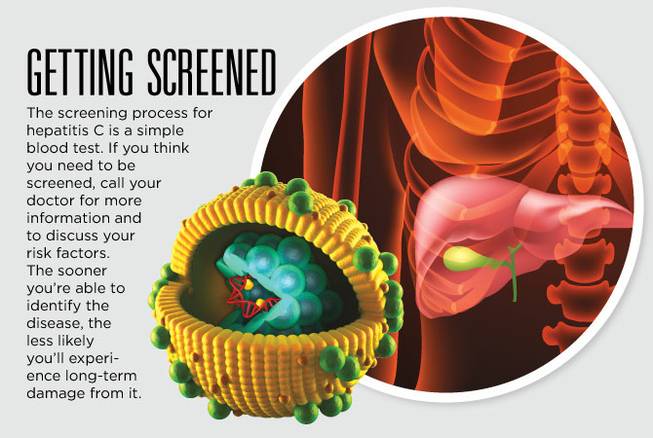
Monday, Aug. 7, 2017 | 2 a.m.
The Centers for Disease Control and Prevention recommends that everyone born between 1945 and 1965, often called the baby boomer generation, be screened for hepatitis C.
While hepatitis C is a common disease, many people with the condition don’t know they have it because it is typically asymptomatic. However, when left untreated, it can cause long-term liver damage, organ failure and cancer.
The CDC estimates that 75 percent of people who have hepatitis C are baby boomers. “Anyone can get hepatitis C and there are many risk factors, but it’s important that baby boomers get screened, especially if they’ve never been tested before,” said Hossein Akhondi, MD, internal medicine specialist at MountainView Hospital.
While it’s not definitively known why baby boomers are more likely to have hepatitis C, there are multiple theories and possible explanations.
What is hepatitis C?
Hepatitis C is a liver disease caused by a viral infection.
The infection can be acute, lasting only a short period of time, or chronic, lasting the patient’s lifetime. “In some instances, patients may become infected and see the virus clear up within a few months, but about 75 to 85 percent of patients will develop chronic hepatitis C,” Akhondi said.
The CDC reports that chronic hepatitis C is the leading cause of liver cancer and liver transplants in the United States.
The hepatitis C virus is transmitted when bodily fluids, primarily blood, of an infected person enter the bloodstream of someone else. Today, the most common transmission method is through sharing needles, but it also can be spread through needlestick injuries, sexual contact and sharing personal care products (such as razors and toothbrushes).
For some time, it was commonly spread through blood transfusions and organ transplants, but screening protocols implemented in 1992 have largely prevented this transmission method since.
Hep. C vs. other types
Hepatitis is a term that describes inflammation of the liver, which can be caused by drug/alcohol abuse, exposure to toxins and bacterial/viral infections. A group of viruses can also cause hepatitis — the most common types are hepatitis A, hepatitis B and hepatitis C. There is a vaccine for types A and B, but not yet for type C.
Why baby boomers are at a high risk
It’s likely that most baby boomers who have hepatitis C contracted the disease in the 1960s through the 1980s, when transmission rates were the highest. During this period, before universal infection-control procedures were adopted, many people were infected in medical settings.
Infections also may have occurred because of risky lifestyle behaviors — such as intravenous drug use/needle-sharing and unprotected sex — prior to public education about blood-borne illnesses.
Baby boomers aren’t the only ones at risk, though. It’s recommended that people with the following risk factors be screened for the infection as well:
• People who inject drugs, or have ever injected drugs (even if only once)
• People who received clotting factor concentrates produced before 1987
• People who were ever on long-term hemodialysis
• People with HIV
• People who received a blood transfusion or organ transplant before July 1992
• People who have recognized exposure, such as being born to a mother with the infection or health care workers after a needlestick injury
Hepatitis C progression
Chronic hepatitis C does not always progress to long-term liver damage. Some patients live comfortably their entire lives with hepatitis C and never experience symptoms or liver disease. However, when patients do develop liver disease, it can be serious and difficult to treat.
“We don’t know why the disease progresses for some patients and not others, but because of this, it’s important to identify the disease early. Once you know you have chronic hepatitis C, you can have your liver enzymes checked regularly to monitor for progression,” Akhondi said.
Treatment
Historically, hepatitis C has been difficult to treat, but this is no longer the case. “Over the past two or three years, there has been a revolution in hepatitis C treatment,” Akhondi said. “There is now an oral regimen that has a 100 percent cure rate.”
Though this treatment is expensive, it signals new hope for people who are living with chronic hepatitis C.
Getting screened
The screening process for hepatitis C is a simple blood test. If you think you need to be screened, call your doctor for more information and to discuss your risk factors.
The sooner you’re able to identify the disease, the less likely you’ll experience long-term damage from it.

Join the Discussion:
Check this out for a full explanation of our conversion to the LiveFyre commenting system and instructions on how to sign up for an account.
Full comments policy